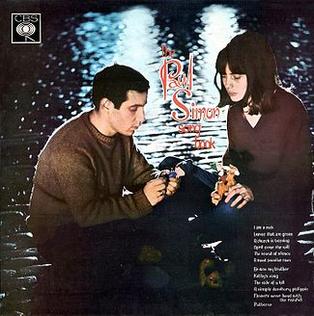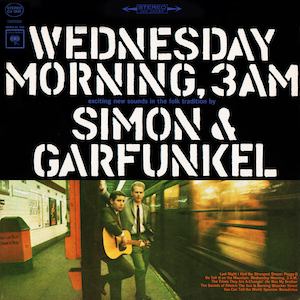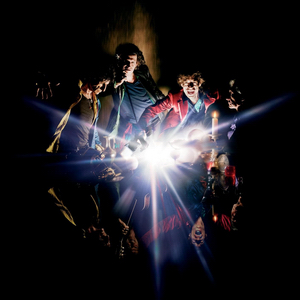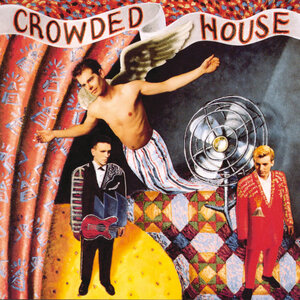
The boys of R.E.M. didn’t quite make it to their alleged goal of breaking up at the stroke of midnight on the millennium, as drummer Bill Berry quit before they got there. He left on the condition that doing so wouldn’t break up the band, so it was with heavy hearts and not a small amount of pressure that the remaining trio forged ahead with the recording of a new album. And when it’s time to change, you’ve got to rearrange, so they parted with co-producer Scott Litt after ten years and six albums. They even tried to simplify, going back to the one-word title. The packaging also included full lyrics for the first time ever on an R.E.M. album. (
Up arrived with the blessing of Peter Gabriel, who was planning to use the same title for
his own album, which wouldn’t surface for another four years.)
Knowing full well that whatever they did next would be under intense scrutiny, they went out of their way not to sound like themselves, relying on lots of wacky sounding (for R.E.M.) keyboards, using primitive old-school synthesizers and programmed drums. Up is full of contradictions, from the hopeful yet unfulfilled prophecy of the album title to the reliance on “old” sounds in order to sound “new”. This is immediately evident on the opener, the very Eno-esque “Airportman”. “Lotus” sounds more like standard R.E.M., with an electric piano for a New Adventures In Hi-Fi vibe. “Suspicion” is long but not boring, which is a plus. One of the most talked about songs was “Hope”, built around a distorted riff that could be described as Eno-esque (we really are going to try to stop using that term) and a lyrical/melodic structure borrowed from Leonard Cohen’s “Suzanne”, with subject matter that seems to entail a hospital. The highlight of the album is “At My Most Beautiful”, their first and best Beach Boys homage, built around a lovely Mike Mills piano piece. The melody isn’t much—another cousin of “Hairshirt”, “Radio Song”, and “Nightswimming”—but the moment where the harmonies make their chromatic lift proves that they have indeed found a way to make us smile.
Unfortunately the album starts to slide from there. “The Apologist” sports an okay organ part and a nice Coral sitar effect, but the “I’m sorry/so sorry” chorus was done better on Reckoning, and the closing “goodbye” just sounds wrong in the middle of the album. “Sad Professor” adds more guitar for something of a step up and “You’re In The Air” has a nice string part, but by now listeners would be excused for falling asleep. “Walk Unafraid” is a rewrite of both “The Apologist” and “Bang And Blame”, and should have been honed into one better track.
However, “Why Not Smile” gains momentum nicely over harpsichord, and Peter gets to layer a bunch of guitars, for a better display of the album’s potential. “Daysleeper” is a slow “Midnight Cowboy”, but Stipe’s lyrics work best when they’re not so literal. “Diminished” seems a more developed “Country Feedback”, but that’s probably just the pedal steel. A fragment of Stipe singing “I’m Not Over You” on acoustic is unlisted but included in the lyrics. The unsettling “Parakeet” snakes around a haunting prepared piano, and “Falls To Climb” returns the canned Eno-esque synth sound, very sterile and cold. (We really did try, honest.)
Up was a step in the right direction, with their most memorable melodies in a good while. At first listen it seemed an improvement over the autopilot of the last couple of albums, but the novelty wears off pretty quickly. (It’s tough when your first four albums are great, because when you put out something that’s merely “good”, that translates as “not great”.) Low-key but not as autumnal as Automatic For The People, it ultimately makes you want to go back and try to decipher what Bill brought to the table, because he is missed. Maybe he might have helped them cut it down to under an hour, for instance. We recommend chopping out the middle four songs, for a shorter, if not necessarily superior listen.
The 25th Anniversary Edition included a bonus CD containing a live performance, presented as a rehearsal, recorded for an appearance on the onetime hit TV show Party Of Five with the expanded six-man lineup and a very chatty Stipe. Oddly, the performance of “At My Most Beautiful” used on the show is not included, but he does stumble through a solo performance of “I’m Not Over You”, explaining how he kinda stole it from Smashing Pumpkins’ “Disarm”. (A pricier edition added a Blu-ray disc with the requisite hi-res audio, plus some videos.)
R.E.M. Up (1998)—3
2023 25th Anniversary Edition: same as 1998, plus 12 extra tracks (Deluxe adds Blu-ray)
 Following Lou and John’s collaboration on the Andy Warhol tribute, one of the more improbable reunions occurred in 1993 when the original band, including Sterling Morrison and Maureen Tucker, got together for a tour. Unfortunately, it didn’t last long enough to make it out of Europe intact. (John blamed Lou, Lou blamed everyone else, and the other two had the class to keep their mouths shut about it all.)
Following Lou and John’s collaboration on the Andy Warhol tribute, one of the more improbable reunions occurred in 1993 when the original band, including Sterling Morrison and Maureen Tucker, got together for a tour. Unfortunately, it didn’t last long enough to make it out of Europe intact. (John blamed Lou, Lou blamed everyone else, and the other two had the class to keep their mouths shut about it all.)







